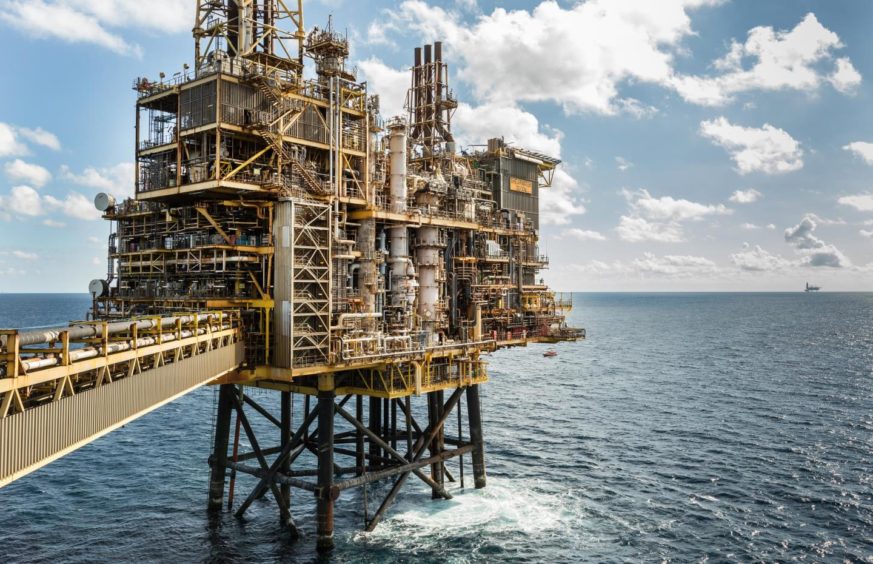 © Bloomberg
© Bloomberg Shell chief executive Ben van Beurden says a windfall tax on the profits of North Sea companies is unlikely to ease the problems caused by lofty gas prices.
While acknowledging “the need for politicians to react”, he underlined the importance of taking a “very close look” at what prompted the collapse of numerous UK energy companies.
“These problems are of course caused by regulatory changes,” Mr van Beurden said, that have to be “updated” to make “energy affordable”.
Shell (LSE: RDSA) reported pre-tax profits of around £22 billion in its 2021 results, a dramatic U-turn on 2020 when the oil and gas giant slumped to losses of about £20bn.
Mr van Beurden described the company’s financial performance as “very strong”, hailing a “momentous year”.
Shell’s bounce back has been aided by more buoyant oil and gas prices, which have sparked a cost-of-living crisis in the UK.
Price cap increase to impact millions
Ofgem announced on Thursday that the energy price cap will increase by £693 from April, impacting about 22 million consumers.
The regulator said: “The increase is driven by a record rise in global gas prices over the last 6 months, with wholesale prices quadrupling in the last year.”
Following the supermajor’s results, fresh calls were made for the UK Government to tap into the takings of North Sea companies in order to ease the growing spectre of rocketing bills.
Energy prices are rising to £1,971 per year, hitting people across the country.
A windfall tax on the mega profits made by fossil fuel giants could raise £4bn and be used to protect people from soaring prices! This is the fairest solution to the #EnergyCrisis.#EnergyPrices pic.twitter.com/YNjjGPM5Ai
— Greenpeace UK (@GreenpeaceUK) February 3, 2022
Environmental campaign group Greenpeace said: “Instead of leaving families to foot the bill for the gas price crunch, Rishi Sunak should tax the bloated profits of fossil fuel giants and use the money to help cash-strapped households and insulate homes.”
Similarly Tessa Khan, director of Uplift, accused the company of “gross profiteering” at a time when families are going to “struggle to heat their home”.
What can Shell do to help?
Mr van Beurden said the current situation is “very concerning” but that he’s “not convinced” that a windfall tax would help with supply or demand.
He said: “This is driven very much by a global dynamic and as a small player like we are, with around 1.5% of energy supplies, there’s only so much that we can do.
“What can and should a company like Shell do? First of all make sure that here in the UK the infrastructure that we have is operated well. And we do with both our offshore and onshore assets.
“The second thing we should do is bring gas from other parts of the world to alleviate the situation in Europe, and particularly in the UK. In the last year we’ve been diverting cargoes from other markets into Europe – about 3% of our global business is currently directed towards the UK.
“The third thing, which may not sound self-evident, is staying in business – 28 energy suppliers have fallen over in the UK. We have a business like that as well that has also struggled but we’ve been able to keep going while also taking on customers from those competitors that have not been able to deal with the outrageous volatility that we’ve seen.”
‘A favourable fiscal environment’
In recent weeks North Sea oil and gas chiefs have voiced concerns that a windfall tax could incite companies to invest elsewhere.
Trade body Oil and Gas UK (OGUK) also said it would reduce the amount of cash companies were able to spend on the energy transition.
Mr van Beurden said: “We still want to continue to invest in the UK North Sea, and particularly in gas projects that will help alleviate pressures in the near and mid-term. There’s actually quite a funnel of good gas projects that we want to develop with relatively short timelines.
“Of course we are looking for a favourable fiscal environment to make these investments tangible so that we’re incentivised to prioritise capital towards the UK.”

